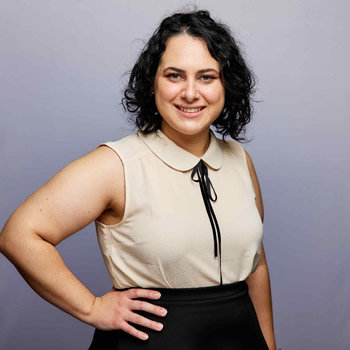Dr. Monika FrancoBy Patricia Baldrich, Ph.D.  Dr. Monika Franco is a Policy Analyst at the Association for Molecular Pathology (AMP), which is a medical, not-for-profit professional society that represents over 2,900 molecular diagnostic professionals. Dr. Franco earned her bachelor's degree in biochemistry and chemical biology at Wayne State University (Detroit, MI, USA), where she conducted research with Dr. Mary Kay Pflum focusing on the development of chemical tools to investigate bacterial kinases. Monika then pursued her Ph.D. at the University of Michigan in Ann Arbor (MI, USA), under the guidance of Dr. Kristin Koutmou. Her thesis work centered on investigating the effects of mRNA modifications on translation, in particular pseudouridine. During her time in graduate school, Monika participated in several professional development activities. These included the Rackham Diversity, Equity and Inclusion (DEI) Certificate Program and the Science, Technology, and Public Policy Certificate Program. Additionally, Monika served as a Student Council Representative to help amplify the voice of graduate students and participated in the organization of multiple symposiums.
Through her various activities, Monika noticed a lack of trust between the public and scientists. This realization led her to her current role, where she can leverage her scientific training to influence policy decisions. She encourages all graduate students to explore diverse career opportunities and maintain an open mind about the future. Monika utilized the University of Michigan Career Center resources throughout her career, which many institutions have. She would go to almost every career panel talk/career event the center held, even if it sounded like something she would have no interest in. After each panel, Monika would reach out to panelists to try and conduct informational interviews and learn more about the career path that she was interested in. Furthermore, she would schedule appointments with career advisors for help with her resume, looking into different jobs, and even her LinkedIn profile. As previously mentioned, Monika participated in the Rackham DEI Certificate Program and this coursework helped her identify internal biases so she could become more culturally competent and work to create a diverse and inclusive work environment, no matter which position she held. Monika believes DEI isn’t a goal, but a mindset. If you are not striving to make your establishment the most diverse, equitable, and inclusive environment then you are not doing the bare minimum. Monika’s goal in any position she works in is to improve upon the organization's DEI efforts, and she hopes that she can also work to make more equitable health care through her work in public policy. Monika has always been inspired by two brilliant pioneer scientists who made huge contributions to women in their field: Dr. Marie Skłodowska–Curie and Dr. Mae C. Jemison. Dr. Skłodowska–Curie was the first woman to win a Nobel Prize, and the first person to win a Nobel Prize twice, in two different fields. Dr. Jemison was the first black woman in space, as well as a medical doctor, engineer, and Peace Corps member. She is currently running the 100-Year Starship Project.
When asked about her biggest challenge, Monika responded, “Myself. I sometimes am my own worst enemy.” Despite being a smart and successful scientist, she is still learning to overcome self-doubt by recognizing her accomplishments and taking time to live in the moment, she even said in regard to those either in grad school or early in their career “We have so much to accomplish in our lives, who says it all must be done right now?” Her recommendation for any early career scientist is to find a hobby, especially outside of the science field. Monika herself likes to spend time doing yoga, playing D&D, and recently started woodworking and whittling.
Dr. Monika Franco's favorite RNAs are mRNAs, although tRNAs, particularly Phe tRNA, will always have a special place in her heart. One of her favorite memories of an RNA meeting is the moment her lab mate and best friend, Dr. Tyler Smith, won an award for his poster presentation in 2022. Her favorite RNA paper is: Disease-associated mutations in mitochondrial precursor tRNAs affect binding, m1R9 methylation, and tRNA processing by mtRNase P. If you want to contact Dr. Monika Franco, you can find her on LinkedIn at https://www.linkedin.com/in/monika-franco/. |
